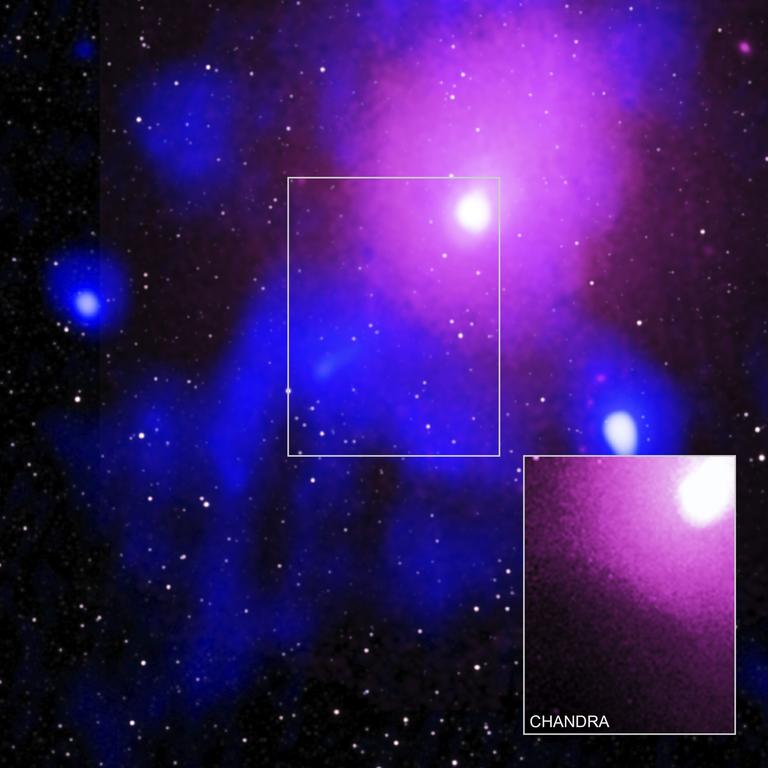Astronomers discover biggest explosion ever seen in the universe and it came from a supermassive black hole
Australian scientists have helped US astronomers discover the biggest explosion ever seen in the universe — and it came from a supermassive black hole

READING LEVEL: GREEN
Astronomers* have discovered the biggest explosion seen in the universe and it came from a supermassive black hole*.
Scientists said the blast was so huge it left a dent* in the universe after coming from a black hole in a group of galaxies* 390 million light years* away.
The explosion carved out a crater* as big as 15 Milky Way galaxies in the hot gas, said lead author Simona Giacintucci of the Naval Research Laboratory in Washington.
The blast was five times bigger than the previous record-holding explosion.

Astronomers used NASA’s Chandra X-Ray Observatory to make the discovery, along with a European space observatory and ground telescopes in Australia and India.
They believe the explosion came from the heart of the Ophiuchus cluster* of thousands of galaxies where a large galaxy at the centre contains a massive black hole.
Black holes don’t just draw matter* in. They also blast out jets of material and energy.
The first hint of this giant explosion actually came in 2016. Chandra images of the Ophiuchus galaxy cluster then revealed an unusual curved edge, but scientists ruled out a blast given the amount of energy that would have been needed to carve out such a large cavity* in the gas.
The two space observatories*, along with radio data from telescopes in Australia and India, confirmed that the curved edge, was part of a cavity.
“The radio data fit inside the X-rays like a hand in a glove,” co-author Maxim Markevitch of NASA’s Goddard Space Flight Centre in Maryland, said. “This is the clincher* that tells us an eruption of unprecedented* size occurred here.”
The blast is believed to be over now with no signs of jets currently shooting from the black hole.
The findings appeared in the Astrophysical Journal.
GLOSSARY
- astronomers: someone who studies the stars and universe
- black hole: a part of space with a gravitational field so intense that nothing can escape
- dent: a slight hollow
- galaxies: a system of millions or billions of stars, together with gas and dust, held together by gravity
- light years: a unit of distance in space
- crater: a large bowl-shaped hole in the ground
- cluster: group
- matter: a physical substance that occupies space
- cavity: a hole
- observatories: a room or building housing a telescope to view space
- clincher: a fact
- unprecedented: never done or known before
EXTRA READING
Collision creates supermassive black hole
World’s first photo of a black hole revealed
QUICK QUIZ
- The explosion happened how many light years away?
- What did it carve out in the hot gas?
- Which observatory was used to make the discovery?
- How much bigger was it than the last record-breaking blast?
- How do they know the explosion has finished?
LISTEN TO THIS STORY
CLASSROOM ACTIVITIES
1. Use your vocabulary
There are so many interesting vocabulary words used in this news article. Write down the 10 words that you like best from the story — try to choose ones you wouldn’t usually include in your writing or conversations.
Then write a short science-fiction narrative, weaving in the 10 vocabulary words that you chose from the article.
As an added challenge, try to include at least 10 more super word choices of your own.
Time: allow 30 minutes to complete this activity
Curriculum Links: English; Science
2. Extension
Select one of your vocabulary choices to write an acrostic poem about.
Example:
Curved and empty, all that
Remains
A hole full of nothing
The scar of an
Eruption
Record-breaking in size
Time: allow 20 minutes to complete this activity
Curriculum Links: English; Science
VCOP ACTIVITY
With a partner see if you can identify all the doing words/verbs in this text. Highlight them in yellow and then make a list of them all down your page. Now see if you and your partner can come up with a synonym for the chosen verb. Make sure it still makes sense in the context it was taken from.
Try to replace some of the original verbs with your synonyms and discuss if any are better and why.
Curriculum Links: English, Big Write and VCOP
HAVE YOUR SAY: What fascinates you most about space? (Hint: is it black holes, stars, galaxies etc?)
No one-word answers. Use full sentences to explain your thinking. No comments will show until approved by editors.

